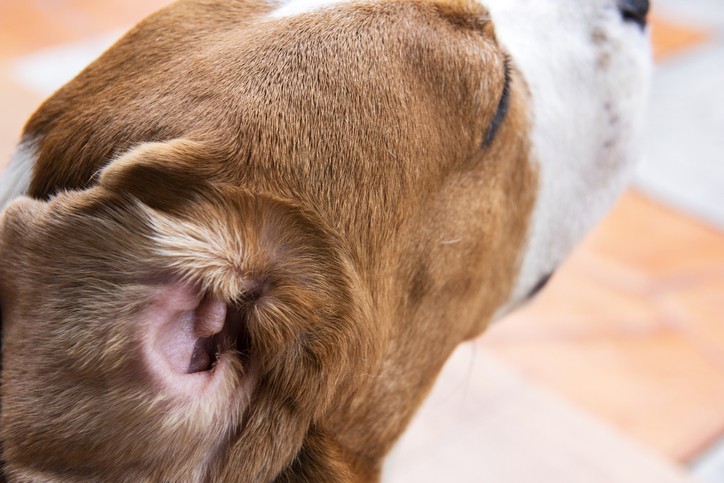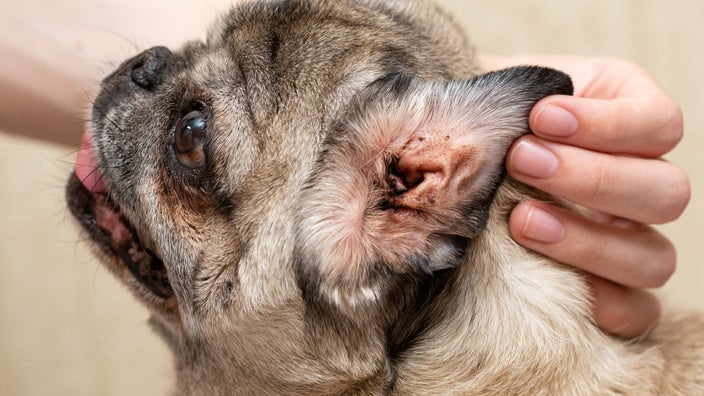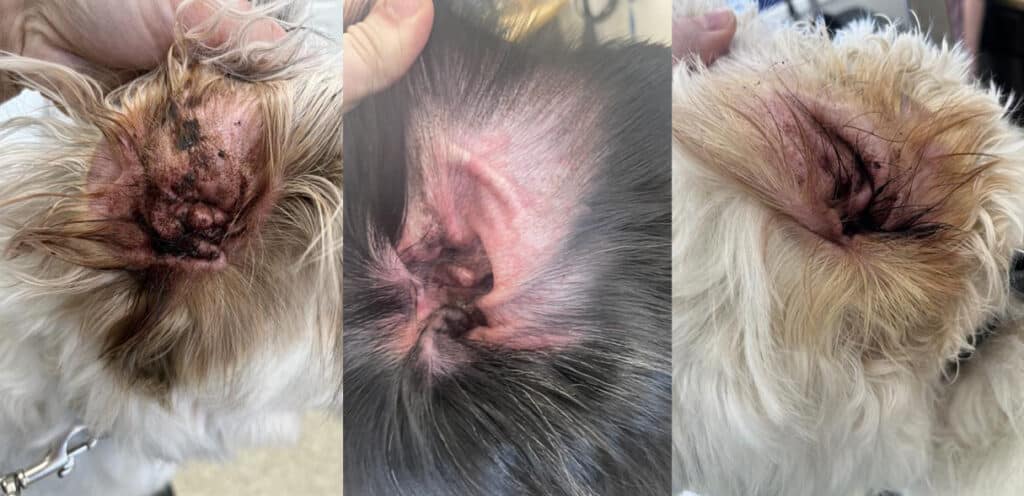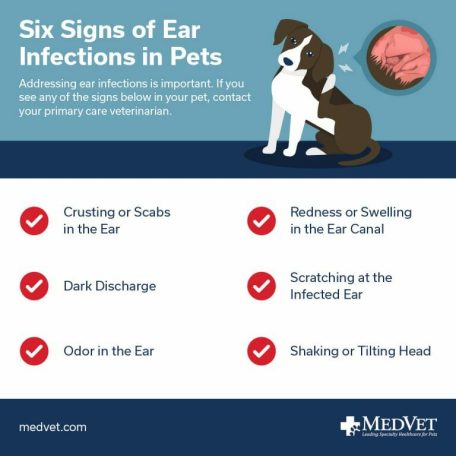To tell if a dog has an ear infection, look for symptoms such as pawing at the ear, head-shaking, redness inside the ear, odor, discharge, and signs of pain. Treating a dog’s ear infection at home without veterinary instruction can cause more harm than good, so it’s important to seek professional help.
If left untreated, an ear infection can lead to hearing loss and chronic issues.

Credit: www.bostonveterinary.com
Signs And Symptoms Of Ear Infection In Dogs
Dogs can develop ear infections for various reasons, such as allergies, excessive moisture, or foreign objects trapped in the ear canal. It’s important for dog owners to be aware of the signs and symptoms of an ear infection so that proper treatment can be sought promptly. Here are some common indicators to look out for:
Head-shaking
One of the telltale signs that a dog may have an ear infection is excessive head-shaking. If you notice your dog vigorously shaking their head from side to side, it could be a sign of discomfort or irritation in the ear. This behavior is typically an attempt to relieve the itching or pain caused by the infection.
Pawing At The Ear
Another notable sign of an ear infection in dogs is persistent pawing at the affected ear. If you observe your dog repeatedly scratching or rubbing their ear with their paw, it could indicate an underlying infection. Dogs may paw at their ear in an effort to alleviate the itching or discomfort caused by the infection.
Redness Inside The Ear
Redness or inflammation inside the ear is a visual cue that an infection may be present. When examining your dog’s ear, look for any signs of redness, swelling, or heat. These are indications of an inflammatory response and can often accompany an ear infection.
Odor
A foul odor emanating from your dog’s ear can be a strong indicator of an ear infection. Infections in the ear can produce a distinct smell, often described as musty or unpleasant. If you notice an unusual odor coming from your dog’s ear, it’s important to address it promptly with appropriate veterinary care.
Discharge
Another symptom to be aware of is the presence of discharge from the ear. This discharge may appear as a thick wax-like substance, pus, or even blood. The color and consistency of the discharge can vary depending on the severity and type of infection. If you observe any unusual discharge from your dog’s ear, it’s crucial to consult a veterinarian.
Pain
Dogs with ear infections may exhibit signs of pain or discomfort. They may display sensitivity when their ear is touched or become irritable and agitated. If your dog shows signs of pain, such as whimpering, hiding, or avoiding touch near the ear, it’s essential to seek veterinary care promptly.
Identifying the signs and symptoms of an ear infection in dogs is crucial for early detection and treatment. If you suspect that your dog may have an ear infection based on the mentioned symptoms, it’s best to consult a veterinarian for a proper diagnosis and appropriate treatment.

Credit: www.goodrx.com
Treatment Options For Dog Ear Infections
If your dog is constantly pawing at their ear or shaking their head, it could be a sign of an ear infection. Look for redness, swelling, and a foul odor. Treatment options include medicated ear drops and antibiotics prescribed by a veterinarian.
Veterinary Treatment
When it comes to treating a dog’s ear infection, veterinary treatment is usually the most effective option. A veterinarian will be able to properly diagnose the infection and prescribe the appropriate medication. This may include ear drops, ointments, or oral antibiotics. In some cases, a veterinarian may also need to clean the dog’s ears to remove any buildup or debris.Home Remedies
While home remedies may seem convenient, it’s important to remember that they should only be used under the guidance of a veterinarian. Using the wrong home remedy can actually worsen the infection or cause additional issues. It’s best to consult with a vet before attempting any home remedies for a dog’s ear infection.Some common home remedies for dog ear infections include:- Apple cider vinegar – This can be used as a natural ear cleaner and has antibacterial properties.
- Coconut oil – Applying a small amount of coconut oil to the inside of the ear may help soothe irritation.
- Warm chamomile tea – This can be used as a gentle ear flush to help relieve discomfort.
- Probiotics – Adding probiotics to a dog’s diet may help promote overall ear health.
Prevention And Care For Dog Ear Infections
If you notice your dog constantly pawing at their ear or shaking their head, it may be a sign of an ear infection. Other symptoms include redness, swelling, and a foul odor. It’s important to seek veterinary care to properly diagnose and treat the infection.
Regular Cleaning
Regular cleaning is an essential part of preventing and caring for dog ear infections. Keeping your dog’s ears clean helps remove dirt, debris, and excess moisture that can lead to infections. Make sure to use a gentle dog ear cleaning solution and follow these steps:- Gently lift your dog’s ear flap and inspect the ear for any signs of redness, swelling, or discharge.
- Dampen a cotton ball or pad with the ear cleaning solution.
- Gently wipe the inside of the ear, focusing on the folds and crevices where dirt and debris can accumulate.
- Avoid inserting anything deep into the ear canal as it can cause injury.
- Repeat the process on the other ear, using a fresh cotton ball or pad.
Avoiding Irritants
In addition to regular cleaning, it is important to avoid irritants that can contribute to ear infections in dogs. Common irritants include:- Allergens: Dogs can develop allergies to certain foods, environmental factors like pollen, or even to specific ingredients in grooming products. Identifying and avoiding these allergens can help prevent ear infections.
- Moisture: Excess moisture in the ear can create a breeding ground for bacteria and yeast, leading to infections. Avoid letting your dog’s ears remain wet for long periods, especially after baths or swimming.
- Foreign Objects: Dogs are curious creatures and may introduce foreign objects into their ears, such as grass seeds or small insects. Regularly checking your dog’s ears for any foreign objects and removing them can prevent potential infections.
Proper Ear Care Routine
Establishing a proper ear care routine is crucial for preventing and caring for dog ear infections. Here are some important steps to include in your routine:- Regular inspection: Take the time to regularly inspect your dog’s ears for any signs of redness, swelling, discharge, or a foul odor. Early detection is key in preventing infections from worsening.
- Professional grooming: Regular visits to a professional groomer can help keep your dog’s ears clean and free from excessive wax build-up. Groomers are trained to handle delicate areas like the ears and can provide a thorough cleaning.
- Diet and nutrition: Ensuring your dog has a balanced diet and proper nutrition can help support their immune system and overall health, reducing the chances of developing ear infections.
- Regular veterinarian check-ups: Schedule regular check-ups with your veterinarian who can perform a comprehensive examination of your dog’s ears and provide guidance on proper care.

Credit: smoochie-pooch.com
Frequently Asked Questions Of How To Tell If A Dog Has An Ear Infection
How Can I Treat My Dogs Ear Infection At Home?
To treat your dog’s ear infection at home, it is important to consult a veterinarian. Treating with home remedies can cause more harm and complications. Avoid putting anything in your dog’s ear without veterinary instruction to prevent pain, balance issues, and hearing loss.
In most cases, ear infections do not go away on their own and can lead to chronic problems if left untreated. Seek professional help for accurate diagnosis and treatment.
Will Dog Ear Infection Go Away By Itself?
No, dog ear infections do not go away on their own. Delaying treatment can lead to more severe issues like hearing loss and the need for surgery. Look for symptoms like pawing at the ear, head shaking, redness, odor, discharge, and pain.
Seek veterinary treatment for proper care.
How Do I Know If My Dog Has An Ear Infection Or Just Dirty Ears?
Determine if your dog has an ear infection or just dirty ears by looking for signs such as pawing at the ear, head-shaking, redness inside the ear, odor, discharge, and pain.
Do Dogs Act Up When They Have An Ear Infection?
Yes, dogs may act up when they have an ear infection. Head shaking is a common symptom as they try to relieve the pain and pressure in their inflamed ears.
Conclusion
If you suspect that your dog may have an ear infection, it is essential to take action promptly. Ignoring the issue can lead to complications such as hearing loss or chronic problems. Look for signs such as head-shaking, pawing at the ear, redness, discharge, odor, or pain.
Remember, it is crucial to seek veterinary advice before attempting any home remedies. By being proactive and attentive, you can ensure your furry friend stays healthy and happy.



